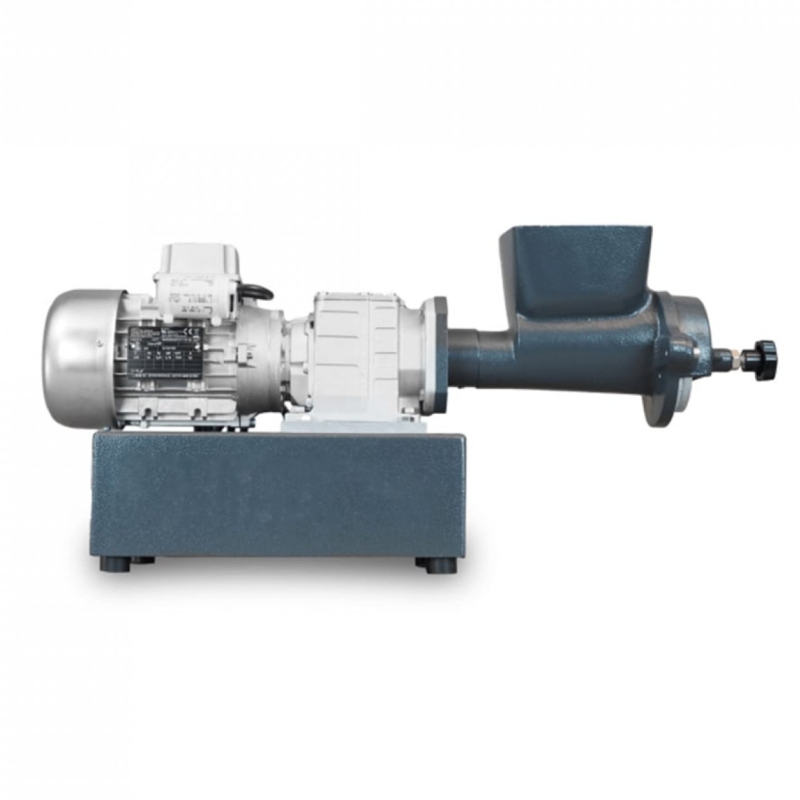Bastak Crushing Mill 1600 – Precision Laboratory Disc Mill for Sample Preparation
The Bastak Crushing Mill 1600 is a high-performance laboratory disc mill designed for efficient grinding of cereals, legumes, oilseeds, and feed materials. This sample preparation grinder is essential for laboratories conducting moisture, ash, and other quality analyses, ensuring consistent and reliable results.
Equipped with wear-resistant, channeled grinding discs, the Crushing Mill 1600 offers adjustable particle sizes ranging from 0.2 to 15 mm. Its robust design ensures that samples are ground without significant heat generation, preserving moisture content—a critical factor in accurate analysis. The device operates at a speed of 1600 rpm, delivering a grinding capacity of 50–100 grams per minute, depending on product density.
Constructed from durable cast iron, the mill features corrosion-resistant components and an ergonomic design, making it a reliable tool for long-term laboratory use. The integrated sample collection container ensures that both the husk and inner parts of the grain are collected together, facilitating comprehensive analysis.
The Bastak Crushing Mill 1600 is particularly beneficial for laboratories requiring precise and efficient sample preparation. Its ability to produce homogenous samples without moisture loss makes it ideal for tests such as moisture determination in drying ovens and ash content analysis in muffle furnaces. Additionally, it serves as a pre-grinding tool before processing samples in hammer or roller mills.
With its compliance to international standards and user-friendly operation, the Crushing Mill 1600 stands out as a vital instrument in the realm of grain milling laboratory equipment. Its precision and reliability make it indispensable for professionals aiming for excellence in sample analysis.
ADVANTAGES
– Grinding process is carried out by international standards.
– Sample particle size can be adjusted by zooming in and out the grinding discs between 0.2-15 mm.
– During grinding, there is no heating in the grinding discs and no moisture loss in the sample.
– For milled products, the husk and the inner part of the seed (e.g. flour and bran in wheat) are collected in the same sample collection container.
– Grinding capacity is 50-100 grams.
– Grinding efficiency is 100 per cent.
– The milled samples are used especially for the classical method moisture test in the oven and ash test in the muffle furnace.
– Apart from these tests, it is sometimes used for pre-grinding before the grinding process is carried out in hammer mills, roller mills, etc., to reduce the sample sizes of very coarse samples to smaller sample sizes suitable for grinding in these mills.
– It has a robust, long-lasting, ergonomic design.
– It offers a unique grinding experience to the user.
The two main products obtained by grinding wheat grain are wheat flour and bran grain. For the miller who first processes the wheat, quality is the high yield of white flour and milling quality of wheat but low energy consumption. Wheat flour yield is an important characteristic not only for the milling industry but also for wheat quality. By using experimental milling methods (AACC 1983, 26-20, 26-21, 26-30), the commercial milling performance of wheat can be determined with the help of laboratory research mills.
Working Principle; The principle of grinding in crushing grinding is high speed rotating speed: 1600 rpm discs are based on the principle of crushing the sample in the grinding bowl. Sample is fed into the grinding bowl from the top of the device. The sample is transferred to the grinding discs by means of spiral-shaped blades rotating at high speed to the grinding chamber. While the grinding discs rotate at high speed, it compresses the sample and grinds it.
Industrial Application Areas; Bastak company manufactures roller, hammer and burn mills with 8 different types of mills. It is the only manufacturer in the world with such a wide range of mill types. With these different types of mills, it is possible to perform physical, chemical, microbiological, physicochemical, photochemical, rheological and organoleptic tests, especially moisture. Our mills are used in many sectors required by the industry. More than 20,000 devices of Bastak technology, including laboratory mills, are actively operating in 150 countries around the world. Globally, a significant amount of economic assets are classified by testing the samples prepared by Bastak Laboratory Mills. These mills have received the ICC standard and have been made available to all universities, academicians, research centres, and international quality control laboratories in the world and have received international standards. The results have become indisputably acceptable in the world. With the values obtained from these mills, the quality control of the semi-finished product is carried out starting from the analysis of the raw material at the entrance of the factory. Thus, the quality control of the semi-finished product is determined in advance. Companies determine the economic value of the raw materials they buy by paying millions of dollars by classifying them with the help of our laboratory mills with sensitive international standardisation and they are sure of the product they make. Before producing the product, they benefit from Bastak laboratory mills in order to reach the target quality by determining the problem they will encounter taking the necessary precautions and providing raw material patches.


There are no reviews yet.